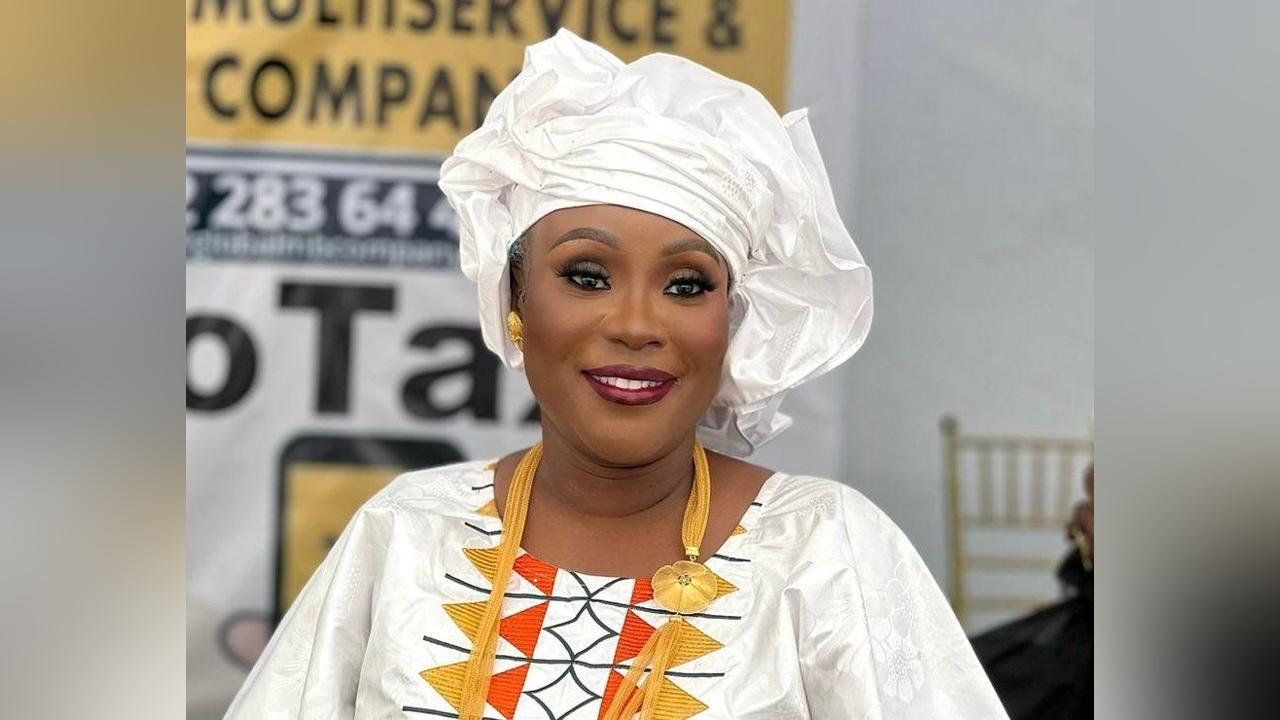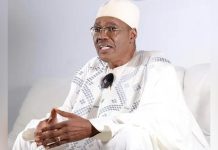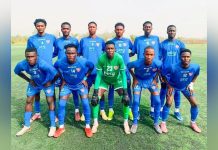Africa-Press – Gambia. In this edition of the Bantaba, we talk to US-born Gambian philanthropist Nenneh Cheyassin Secka-Kebe, whose philanthropy is at work across the country since her return to The Gambia in 2022. In this interview, Nenneh talks about her childhood, work life, her evolution as a philanthropist and how Gambian women can be empowered to battling poverty.
Tell us about your origin and early life?
I am the oldest child of lawyer [Pap Ousman] Cheyassin Secka. His first wife was Saffie Secka. They met in America when they were students. My dad had a scholarship and he went to the US as a student, then my mother was already living there. My mother believed in my father. She was one of his biggest supporters. She supported him through college, through his different career choices. When he finished law school in America, he moved to England and went to Cambridge University and Oxford University. My mother went with him to the UK. My dad became a lawyer, and following the completion of his law degree they decided to return to The Gambia. I was born in the US in 1971 before they moved to the UK where my brother was born. My mum went to the US in 1961 when she was 21 and spent 62 years there. And now she’s 82, so she spent most of her life in the States.
Your father was a prominent lawyer and politician and served as Attorney General and Minister of Justice. What memories do you have of him growing up?
As a child, I know he was always busy. He was hardly around. He was a lawyer and a political figure. He formed his [National Liberation] Party in the late ’70s. I was so young then but I remember he tried to run as a presidential candidate, but that did not work out because he was accused of supporting the Kukoi attempted coup in 1981 and was sentenced to life imprisonment. In fact, he was supposed to face the death sentence but the Queen of England got involved and asked for a pardon and he was pardoned. He spent about eleven years before he was released by Jammeh. He briefly worked here and returned to the US but he wouldn’t stay despite having job offers from CNN and the American University. He turned them down and came back to The Gambia. He had four children with my mother, so when he went to prison in 1981 we went to Sierra Leone, because my mother is half Sierra Leonean. We were in Sierra Leone for five years before going back to the US to my mother. So we haven’t been in The Gambia much at all. I did not come back until I was 40 when my dad died. And then I came back when I was 50. So most of my years have been outside of Gambia. I left at eight and relocated at 50. There’s a lot of lost connection between eight and 50. It’s been a long time.
What prompted you to finally return to The Gambia?
The reason why I really wanted to come is because when my father went to prison and was released after eleven years, we were already young, so we had lost so much time. So coming back to The Gambia was something I always had in the back of my mind, something I always wanted to do. It’s nice to know where you’re from, where you belong, and who you are. Living in America as a black is just something I can’t explain. You feel a sense of displacement. You always feel like an outsider. So I always had a connection with my Sierra Leonean people. But for the Gambian side, I always felt that it was lacking. So it was always important for me to reconnect. My father’s death was a horrible blow to me, emotionally. It was important to me to know him the way I was meant to know him because I heard so many good stories about him, the differences he made in people’s lives. He was supposed to come and spend the summer with me and my children in the US and I spoke to him on the phone and he spoke to my children. We were arranging to buy him a ticket and I was on my way home when my sister called to say he died. As the eldest, I was the one who remembered a lot about him. I was eight when he went to prison, my brother was six, my sister was four and our youngest was four months. So wanting to be close to him was one of the primary reasons why I came. So coming back at 50 has been one of the best decisions I made because I’m very happy here. I thought I was going to work in the US until I was 60 or 65, then retire and come back but when my sister and I opened our business 16 years ago, it was really successful. So it helped me retire sooner than I had planned on. It put me in a financial situation where I could afford to no longer work. Here I have my sense of belonging. I feel at home.
Tell us about your life growing up in the US?
It was difficult because our mother was a single parent raising four children. So we had to do a lot to support her. We had to take student loans to go to college and graduate through student loans. I worked two full-time jobs and paid. But after graduation I was already married, I started having children.
What is your level of education?
I have a bachelor’s degree in business administration and marketing and a master’s degree in business administration. And after that, I went back to school and got a nursing licence. So I’m also a nurse.
You have recently made headlines in social media after you were seen splashing money on famous Senegalese singer Wally Seck and also giving him expensive valuables. Could you tell us about that and how much did you spend?
I had a friend who mentioned to me that she would actually want me to meet Wally and participate in his oncoming event that usually happens during the Christmas period. She proposed to me to be the mother or the queen of the night. The idea clicked to me and I started planning it. I already knew how much money I was going to give him. I already knew how I was going to do it. I wanted it to be unforgettable. I didn’t want it to be another generic Gambian giving Wally money. I wanted it to stand out. I want to give him an amount that’s going to create a buzz that everybody is going to talk about. And something that no one has ever done in The Gambia. So, I told the lady that was making my dress that I didn’t want the regular corset dresses. So she suggested to me about making a spiral dress. We didn’t even discuss the price. I didn’t care how long it was going to take. Because I really wanted something different. Then I spoke to Alieu Sall, a very good friend of mine, to get me the loudest gewels (griots) in the country to be able to attend the event with them and enter with them at the event. They were about six and I gave them each D10,000 to D15,000. I also invited my cousins and bought two other tables each for D100,000. So I spent close to D1million that night.
How much did you give to Wally himself?
Well, I gave him D300,000 that night. The following day, we were supposed to have dinner, but there was so much going on, so I went to visit him, and I asked him why he was giving out the money that I gave him because I saw him give away almost D60,000 to other people while on stage. So I told him I wanted to give him money for himself. That day I gave him D50K. I bought his wife a necklace for D395K or about D400,000. Because the wife didn’t come for the show, he just took it with him to give her.
Has this show created the buzz that you were looking for?
Oh, yeah, it surpassed anything I ever imagined. The money has earned itself a thousand folds.
Really? Yes. It was a worthy investment. If I could do it all over again, I’d probably give him more money.
So how do you manage all that noise around it? But I wanted the noise.
Including the criticisms?
I didn’t care about criticisms. I knew I was going to be criticised. I had all kinds of stuff. For me people who really know me don’t question where the money came from or how much money I have and all that. They don’t question that, because they know me. The people who criticised me are the ones who don’t know me. And I don’t care about those people. They are entitled to their opinion. If you’re thinking a million dollars affects what is in my bank account, why would I take that and give it to Wally? That does not make sense. I am not going to give Wally money that’s going to put me in a situation where I can’t take care of myself and my family. That would be stupidity. I give because it doesn’t affect me. It doesn’t affect my lifestyle. So I feel badly for them because they miss the point of who I am, what I’m trying to do, the joy it gives me to give, the look on people’s faces, the level of gratitude, the way you’re able to change people’s lives. It’s a good feeling.
Would you consider yourself a rich woman? I wouldn’t say that.
Honestly, how rich are you? I wouldn’t say that either. I leave that to you to decide.
Why do you choose to be active in philanthropy? I feel really blessed and I feel I have a responsibility. There are a lot of people who worked harder than I have, who are smarter than I am. I just feel like I have been chosen. God could have given it to anybody else. So for me, that gives me a responsibility. And I do it because I don’t want to be forgotten.
What kind of impact do you want to make?
I want to be someone that when I leave this earth, there are things that they can point out and say, these are the things she did and achieved. I want to make a difference. It’s important to me to make a difference. So I feel a responsibility because when I compare myself to the average person, I have too much. It will be irresponsible for me not to give.
Do you have plans to create a foundation?
We have a foundation in place now. My lawyer is putting things in place, but it’s taking so long. While he’s waiting, I am doing the giving. My goal is to give at least a million dalasis each year. I feel I should be doing more than that based on what I have. So every year, depending on how well I do, I intend to increase that. I think this year I have almost at given out a million and it’s only been six months. So if I go at the pace that I’m going, we’ll probably be at D1.5 million by year end.
How do you think Gambian women can be better supported and empowered, and what role do you see yourself playing in that effort?
I hope that my platform gives me the voice to show women and help them realise that because you’re over 50 doesn’t mean you’re dead when there’s so much more you can do. I especially want younger women to look at my life and see that anything is possible. If you work hard, persevere, yes, there are going to be hard times, you will fall, get up, re-invent and figure out something else. I had about 10 different skills before being a nurse, opening a group home, and running a business with my sister. There are many things that I did, that I failed at. But you have to keep trying.
For More News And Analysis About Gambia Follow Africa-Press






